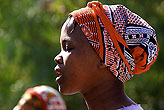SOAWR Youth Essay Competition: Finalist essays

A month ago Solidarity for African Women’s Rights coalition (SOAWR) invited young people to reflect on the contributions women and girls can make to development issues, by writing an essay on the importance of Protocol on the Rights of Women in Africa. The four finalists – Nonyelum Umeasiegbu, Laurence Lemogo, Itodo Samuel Anthony and Nelly Nguegan – will attend this month’s AU summit in Malabo on the theme of 'Youth empowerment for sustainable development’. The six best essays are available in the English and French editions of Pambazuka News.
In October 2010, the African Women’s Decade (2010-2020) was officially launched in Nairobi, Kenya. The decade is a critical moment for the advancement of women’s rights and gender equality on the continent. The Solidarity for African Women’s Rights coalition (SOAWR), a coalition of 37 organisations based throughout the continent, is committed to ensuring that African Union (AU) member states ratify and implement the Protocol to the African Charter on Human and Peoples’ Rights on the Rights of Women in Africa as an instrument that will play an important role in the realisation of the Decade’s objectives. Currently, 30 AU member states[1] have ratified the Protocol. However, 19 member states are yet to ratify and four – namely, Botswana, Egypt, Eritrea, and Tunisia – are not yet signatories to the Protocol. At the same time, unfortunately, not all Africans are aware of the Protocol and its significance.
In Malabo, Equatorial Guinea, this June, African heads of state and government will gather at a summit with the theme, ‘Youth empowerment for sustainable development’. Youth action is critical to the continent’s development, and more specifically, in ensuring that girls and women can make equally valued contributions to this development. As such, Equality Now and other members of the SOAWR coalition invited youth (between 18 and 25 years old) to reflect on the importance of the Protocol on the Rights of Women in Africa through an essay competition in which contestants were asked to respond to the question, ‘Why is the Protocol on the Rights of Women in Africa important to you?’ in an essay of a maximum of 2,000 words in either English or French.
The essay judging panel, led by Equality Now, was comprised of SOAWR members representing Alliances for Africa, Association des Juristes Maliennes, the Centre for Human Rights at the University of Pretoria, Inter-African Committee on Traditional Practices Affecting the Health of Women and Children, People Opposing Women Abuse, and Réseau Interafricain pour les Femmes, Médias, Genre et Développement, as well as Pambazuka editors. They selected four winning essayists – two French speakers and two English speakers – who will all receive a copy of African Women Writing Resistance: An Anthology of Contemporary Voices edited by Jennifer Browdy de Hernandez, Pauline Dongala, Omotayo Jolaosho, and Anne Serafin. The top three essays in both English and French were also selected for publication on the Pambazuka News website (www.pambazuka.org). Equality Now will fund (through the Oxfam Raising Her Voice project) the participation of one winner in the AU June Summit. Oxfam will also support the three other finalists’ participation in the Summit.
The judging panel was pleased to receive well thought out and well-written essays from youth from different parts of the continent, who all emphasise the importance of the Protocol and urge governments to fully commit to its implementation. Nonyelum Umeasiegbu, for example, informs us that ‘If the charter had been implemented even a year after its declaration, I would not have lost my friend to child birth’. Nevertheless, she remains optimistic of the possibility of equality that comes with implementation of the Protocol – optimism shared by Laurence Lemogo who writes (in French), ‘The Maputo Protocol, specific text, directly addresses African women’s rights and is, unquestionably, progress towards the pinnacle of their liberation.’ And yet, according to Itodo Samuel Anthony, ‘This protocol thus provides a powerful tool for change but it needs to be popularized. In spite of my exposure, it took me this essay contest to hear of it for the first time…To make the protocol effective, we would require agency, especially at the grassroots’. Thus, as Nelly Nguegan concludes (in French), ‘What remains is to popularize the Protocol so that no one is ignorant of the law and, above all, to apply it for the success of the struggle. Is this thus not what is at stake and the importance of the Protocol: its application?’
Although it was difficult to select winners, given the quality of all the essays, the writers cited above were all selected as winners of the competition for their English and French essays. Equality Now extends thanks to all the youth who submitted essays as well as to the members of the judging panel for their energetic and close reading of all the essays and for their thoughtful deliberation in selecting the winners. We particularly thank Fahamu for donating the book prizes and the Pambazuka editors for their participation and provision of a platform to widely disseminate these essays. We also thank Oxfam for support in facilitating the finalists’ participation in the AU Summit.
http://www.pambazuka.org/images/articles/535/logos.jpg
BROUGHT TO YOU BY PAMBAZUKA NEWS
NOTES
[1] Angola, Benin, Burkina Faso, Cape Verde, Comoros, Djibouti, Democratic Republic of Congo, Gabon, Gambia, Ghana, Guinea-Bissau, Kenya, Libya, Lesotho, Liberia, Mali, Malawi, Mozambique, Mauritania, Namibia, Nigeria, Rwanda, South Africa, Senegal, Seychelles, Tanzania, Togo, Uganda, Zambia, Zimbabwe.
